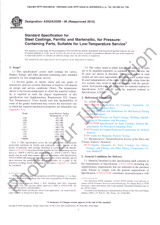Wir benötigen Ihre Einwilligung zur Verwendung der einzelnen Daten, damit Sie unter anderem Informationen zu Ihren Interessen einsehen können. Klicken Sie auf "OK", um Ihre Zustimmung zu erteilen.
ASTM C267-20
Standard Test Methods for Chemical Resistance of Mortars, Grouts, and Monolithic Surfacings and Polymer Concretes
Name übersetzen
NORM herausgegeben am 1.9.2020
Informationen über die Norm:
Bezeichnung normen: ASTM C267-20
Ausgabedatum normen: 1.9.2020
SKU: NS-1007076
Zahl der Seiten: 7
Gewicht ca.: 21 g (0.05 Pfund)
Land: Amerikanische technische Norm
Kategorie: Technische Normen ASTM
Kategorie - ähnliche Normen:
Die Annotation des Normtextes ASTM C267-20 :
Keywords:
brick mortars, chemical-resistant, machinery grouts, monolithic surfacings, polymer concrete, resin materials, silica materials, silicate materials, tile grouts,, ICS Number Code 91.100.10 (Cement. Gypsum. Lime. Mortar)
Ergänzende Informationen
| Significance and Use | ||||||||||
|
4.1 The results obtained by these test methods should serve as a guide in, but not as the sole basis for, selection of a chemical-resistant material for a particular application. No attempt has been made to incorporate into these test methods all the various factors that may affect the performance of a material when subjected to actual service. The strength values obtained by these test methods should not be used to evaluate the compressive strength of chemical-resistant materials. The appropriate ASTM test method for the specific material should be used for determining and evaluating the compressive strength. |
||||||||||
| 1. Scope | ||||||||||
|
1.1 These test methods are intended to evaluate the chemical resistance of resin, silica, silicate, sulfur, and hydraulic materials, grouts, monolithic surfacings, and polymer concretes under anticipated service conditions. These test methods provide for the determination of changes in the following properties of the test specimens and test medium after exposure of the specimens to the medium: 1.1.1 Weight of specimen, 1.1.2 Appearance of specimen, 1.1.3 Appearance of test medium, and 1.1.4 Compressive strength of specimens. 1.2 Test Method A outlines the testing procedure generally used for systems containing aggregate less than 0.0625 in. (1.6 mm) in size. Test Method B covers the testing procedure generally used for systems containing aggregate from 0.0625 to 0.4 in. (1.6 to 1.0 mm) in size. Test Method C is used for systems containing aggregate larger than 0.4 in. 1.3 The values stated in inch-pound units are to be regarded as standard. The values given in parentheses are mathematical conversions to SI units that are provided for information only and are not considered standard. 1.4 This standard does not purport to address all of the safety concerns, if any, associated with its use. It is the responsibility of the user of this standard to establish appropriate safety, health, and environmental practices and determine the applicability of regulatory limitations prior to use. 1.5 This international standard was developed in accordance with internationally recognized principles on standardization established in the Decision on Principles for the Development of International Standards, Guides and Recommendations issued by the World Trade Organization Technical Barriers to Trade (TBT) Committee. |
||||||||||
| 2. Referenced Documents | ||||||||||
|
Empfehlungen:
Aktualisierung der technischen Normen
Wollen Sie sich sicher sein, dass Sie nur die gültigen technischen Normen verwenden?
Wir bieten Ihnen eine Lösung, die Ihnen eine Monatsübersicht über die Aktualität der von Ihnen angewandten Normen sicher stellt.
Brauchen Sie mehr Informationen? Sehen Sie sich diese Seite an.




 Cookies
Cookies
